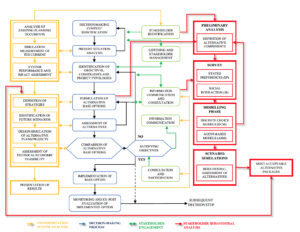A new research paper by Michela Le Pira et. al. addresses the complex problem of multi-stakeholder decisions in urban freight transport policy-making from a public authority perspective, by proposing a procedure based on a modelling approach to support stakeholder involvement in the decision making process. The paper analyses the existing methods that can be used for participatory decision-support, with the intent of contextualizing and introducing the innovative modelling approach.
The modelling approach consists of a well-thought integration of discrete choice models (DCM) with agent-based models (ABM) as an effective way to account for stakeholders’ opinions in the policy-making process, while mimicking their interaction to find a shared policy package.
Integrated modelling
The integrated modelling approach is able to combine the advantages of the two methods while overcoming their respective weaknesses. The integration allows performing an ex-ante behavioural analysis, with the aim of testing the potential acceptability of the solutions proposed.
Results
The integrated modelling approach, integrating DCM and ABM, can be used for participatory decision-support and it can be casted in the overall urban freight transport policy-making process. The results of the behavioural analysis, in terms of ranking of potentially accepted policies, linked with the technical evaluations from transport network modelling tools, provide a sound basis for active participation and deliberation with stakeholders and policy-makers.
The aim is to guide an effective participation process aimed at consensus building among stakeholders, by proposing them a subset of policies that, as a result of a preliminary analysis, are likely to be accepted while performing well in terms of technical results.
This approach represents a promising way to tackle the complexity of multi stakeholder involvement in policy-making and to support an efficient and effective decision-making process. It produces an added value for policy-making and it can be framed in the overall context of transport planning.
Together with technical and economic analyses, the stakeholder behavioural analysis proposed contributes to the ex-ante policy assessment needed to support decision-makers in taking well-thought decisions.

